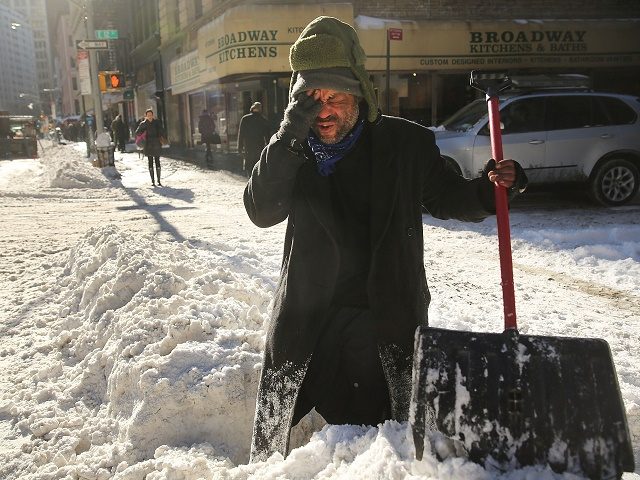A new international study on climate change predicts that Europe and North America will be experiencing bouts of very cold weather, while insisting that the freezing temperatures will be the result of global warming.
In its “pay no attention to that man behind the curtain” moment, the study published Wednesday in the journal Nature Climate Change asks readers to suspend disbelief and continue to have faith in global warming even as they pile more wood on the fire this winter.
While acknowledging that the “chaotic nature of atmospheric circulation precludes easy answers,” the authors suggest that continuing changes in the Arctic are influencing wind patterns and the occurrence of extreme weather events in northern mid-latitudes.
A related study, published in the same journal earlier this week, claimed that the Arctic “polar vortex” has been shifting from North America toward Europe over the course of several decades. This means that winters in Europe and North America have been getting colder and should continue to do so.
Confidently asserting that “Arctic temperature increases are an inevitable aspect of anthropogenic climate change,” they propose “a perspective that rejects simple cause-and-effect pathways and notes diagnostic challenges in interpreting atmospheric dynamics.”
Attentive followers of climate change literature will no doubt recall that several months ago another group of scientists documented that temperatures in the Antarctic Peninsula had been falling steadily for the last 18 years at the rate of nearly one degree Fahrenheit per decade, reversing earlier warming trends and throwing climate change alarmists into a tailspin.
Writing in the journal Nature, the scientists debunked one of the most touted cases of anthropogenic (man-made) global warming in the last 50 years, noting that it was due to natural climate shifts after all.
Many of the fears associated with the rapid warming of the Peninsula, such as the regional retreat of glaciers and disintegration of floating ice shelves, the authors wrote in their article “Climate science: Cooling in the Antarctic,” were not in fact due to “drivers of global temperature change” as previously believed. They were instead caused by a particular microclimate associated with “extreme natural internal variability of the regional atmospheric circulation.”
Nature’s editor noted that although the Antarctic Peninsula is “frequently presented as a case study of rapid warming,” scientists John Turner and colleagues have now shown that warming trends have abated and “for the early years of the twenty-first century the peninsula has in the main been cooling.”
The climate community was wise to hedge its bets and phase out the expression “global warming,” replacing it with the more ambiguous “climate change.”
After all, whether cooler, warmer, wetter, drier or windier, one thing the climate can be counted on to do is change.
Follow Thomas D. Williams on Twitter Follow @tdwilliamsrome

COMMENTS
Please let us know if you're having issues with commenting.